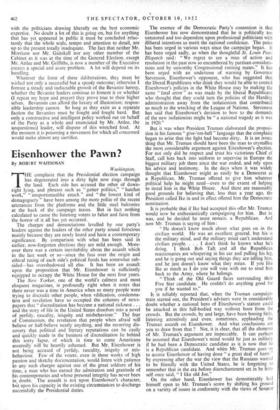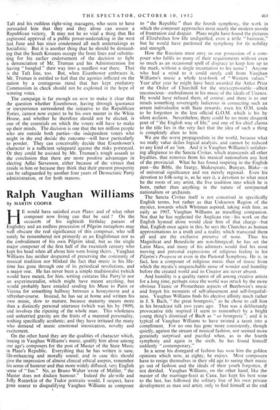Eisenhower the Pawn?
13) ROBERT WAITHMAN THE complaint that the Presidential election campaign has degenerated into a dirty fight now rings through the land. Each side has accused the other of down- right lying, and phrases such as " gutter politics," " hatchet work," " unsportsmanlike attack " and " the lowest kind of demagoguery ' have been among the more polite of the recent utterances from the platforms and the little steel balconies at the back of the campaign trains. ' But in fact nothing calculated to cause the listening voters to falter and faint from the horror of it all has yet occurred.
The charges and denunciations levelled by one party's leaders against the leaders of the other party sound ferocious mainly because they are newly heard and have a contemporary significance. By comparison with what has been said in earlier, now-forgotten elections they are mild enough. More- over there was a certain inevitability about the assault which in the last week or so—since the fuss over the origin and ethical rating of each side's political funds has somewhat sub- sided—has overshadowed all else. It has been an assault upon the proposition that Mr. Eisenhower is sufficiently equipped to occupy the White House for the next four years.
The New Yorker, one of the world's calmest and most eloquent magazines, is profoundly right when it notes that there never was a time in America when so many people were trying to discredit other people, when vilification, condemna- tion and revelation have so occupied the columns of news- papers that " discreditation has become a national sickness . . . and the story of life in the United States dissolves into a novel of perfidy, rascality, iniquity and misbehaviour." The fear of Communism, the revelation that people when afraid will believe or half-believe nearly anything, and the recurring dis- covery that political and literary reputations can be easily and quickly made in the business of discreditation lie behind this sorry lapse, of which in time to come Americans assuredly will be heartily ashamed. But Mr. Eisenhower is not being accused of perfidy, rascality, iniquity or mis- behaviour. Few of the voters, even in these weeks of high passion and sketchy documentation, would listen with patience to any such charges against one of the great soldiers of his time, a man who has earned the admiration and gratitude of his contemporaries and whose personal integrity has never been in doubt. The assault is not upon Eisenhower's character, blit upon his capacity in the existing circumstances to discharge successfully the Presidential duties. The essence of the Democratic Party's contention is that Eisenhower has now demonstrated that he is politically too untutored and too dependent upon professional politicians with illiberal intentions to merit the national confidence. The point has been urged in various ways since the campaign began. It has been urged sadly, as when the thoughtful• St. Louis Post- Dispatch said: " We regret to see a man of action and resolution in the past now so encumbered by partisan considera- tions and by unworthy Congressional running mates." It has been urged with an undertone of warning by Governor Stevenson, Eisenhower's opponent, who has suggested that the liberal Republicans who think they would be able to control Eisenhower's policies in the White House may be making the same " fatal error " as was made by the liberal Republicans who thought that they could turn the policies of the Harding administration away from the isolationism that contributed so much to the wrecking of the League of Nations. Stevenson has said that Eisenhower's decision to bow to the demands of the new isolationists might be " a national tragedy as it was in 1920."
But it was when President Truman elaborated the proposi- tion in his famous " give-'em-hell " language that the complaint began to arise that the fight had become dirty. It is an ironic thing that Mr. Truman should have been the man to crystallise the most considerable argument against Eisenhower's election. For not only did he respect and trust his victorious Chief of Staff, call him back into uniform to supervise in Europe the biggest military job there since the war ended, and rely upon his advice and testimony. In the days when it was widely thought that Eisenhower might as easily be a Democrat as a Republican, Mr. Truman offered to give him whatever political help he might need—even to the extent of helping to instal him in the White House. And there are reasonably good grounds for believing that, less than a year ago, the President called Ike in and in effect offered him the Democratic nomination.
It is probable that if Ike had accepted this offer Mr. Truman would now be enthusiastically campaigning for him. But be was, and he decided he must remain, a Republican. And now Mr. Truman is saying of him : " He doesn't know much about what goes on in the civilian world: He was an excellent general, but his is the military mind, and the military mind can't understand civilian people... . I don't think he knows what he's doing. I think Bob Taft and all the Republican reactionaries are whispering in his ear and pulling his leg, and he is going out and saying things they are telling him, and he just doesn't know what they mean. If you like Ike as much as I do you will vote with me to send him back to the Army, where he belongs.
" Think of the Old Guard- faces surrounding their Five Star candidate. He couldn't do anything good for you if he wanted to."
It is reliably reported that, when the Truman campaign- train started out, the President's advisers were in considerable doubt whether a national hero of Eisenhower's stature could be attacked in this full-bodied way without boos from the crowds. But the crowds, by and large, have been booing little, listening attentively and even, sometimes, applauding the Truman assault on Eisenhower. And what conclusions arc you to draw from that ? Not, it is clear, that all the elements of Mr. Truman's argument are impeccable. It can perhaps be assumed that Eisenhower's mind would be just as military if he had been a Democratic candidate as it is now that he is a Republican candidate. And when Mr. Truman goes on to accuse Eisenhower of having done " a great deal of harm - by expressing after the war the view that the Russians wanted to be friendly with the United States, he is forgetting to remember that in the era before disenchantment set in he him- self once said, " I like old Joe."
On the other hand, Eisenhower has demoriStrably laid himself open to Mr. Truman's ,scorn by shifting his ground on a variety of issues in conformity with the views of Senator Taft gnd his ruthless right-wing managers, who seem to have persuaded him that they and they alone can assure a Republican victory. It may not be so vital a thing that Ike expressed approval of a public power-undertaking in the west last June and has since condemned all such undertakings as Socialistic. But it is another thing that he should be demand- ing that the South Koreans occupy the front lines and substitu- ting for his earlier endorsement of the decision to fight a denunciation of Mr. Truman and his Administration for having " bungled " their way into a needless war there. That is the Taft line, too. But, when Eisenhower embraces it, Mr. Truman is entitled to feel that the agonies inflicted on the nation by a courageous stand that has kept predatory Communism in check should not be exploited in the hope of winning votes.
The campaign is far enough on now to make it clear that the question whether Eisenhower, having through ignorance or inexperience surrendered the initiative to the Republican Tories, cannot now expect to be his own master in the White House, and whether he therefore should not be elected, is one of the essentials on which the voters will have to make up their minds. The decision is one that the ten million people who are outside both parties—the independent voters who might in the end decide the outcome—will have particularly to ponder. They can conceivably decide that Eisenhower's character is a sufficient safeguard against the risks portrayed. Or they could be assisted by Mr. Truman's rough assault to the conclusion that there are more positive advantages in electing Adlai Stevenson, either because of the virtues that reside in him or betause they think that their present prosperity can be safeguarded by another four years of Democratic Party administration, or for both reasons.



































 Previous page
Previous page